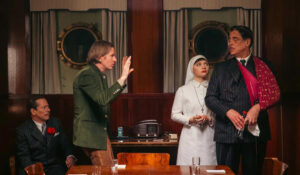It remains true that a director whose work was categorized as part of the “New Sincerity movement” is just as sincere and earnest in his newest endeavor as he’s been since he began in 1996.
Over the last three decades, Wes Anderson has steadily released 12 feature films. In this time he has also done collaborations and commercials with brands like Prada and American Express. In fact, some say his style has become a brand in itself.
However, with every subsequent film, it seems like his style has only become more convoluted. Whereas something like “Rushmore,” his second feature film, follows a protagonist as he navigates through a single narrative in a single place in time, six films later with “The Grand Budapest Hotel,” the narrative follows an ensemble cast in a series of stories within one another spanning decades.
For any fan of the Texas auteur, it has become increasingly hard to share his work with those not interested in his aesthetic compositions or vintage references. His 2021 film, “The French Dispatch,” is a complete alienation to anybody concerned with the kind of typical narrative through-line associated with mainstream American cinema. Actors like Tom Hanks and Scarlett Johansson can be found in multiple of his films but Anderson’s work differs greatly from “Forrest Gump” or “Black Widow.”

What makes his reputation unique is the very fact that he is fundamentally an art-house director whose name and movies cross-over to the mainstream. From artificial intelligence imitations to TikTok-trends, the internet is deeply fascinated with his symmetrical framing and pastel color palette. However with his previous film “Asteroid City” receiving mixed reviews, it seems like his cast of household names and recognizable style are not enough to keep general audiences entertained.
But here comes “The Phoenician Scheme.”
Gone are the story-within-a-story, nested-doll structures of his last few films – “The Phoenician Scheme” is his smallest film in decades. The story follows a “5-percenter” business tycoon Zsa-Zsa Korda, played incredibly by Benicio Del Toro, as he and his nun daughter Liesl, played by Mia Threapleton, work to realize his decade-spanning project “The Phoenician Scheme,” while many attempt to end his company and life.
The film involves assassination attempts, nuns, hand-grenades, basketball, the afterlife, double-agents and so much more. Clocking in at just over 100 minutes, it really flies by.
Critics of his work may continue to argue once again that his latest film is yet another iteration of the same ideas and camera moves he has been utilizing for about the last 30 years, but this differs greatly in a lot of aspects from the majority of his filmography.
For one, though it may appear on the surface level that the film looks the same as the rest of his work, it is actually shot by an entirely different cinematographer in Bruno Delbonnel – best known for his work on the French-hit “Amelie.” The lenses he uses and the way he lights scenes invokes a greater sense of heightened realism compared to the softer, more impressionistic work of his long-time cinematographer Robert Yeoman.
Additionally, though this does contain a score by Alexandre Desplat; a constant he’s had since “Fantastic Mr. Fox,” Anderson’s latest film primarily utilizes the music of Igor Stravinsky and Beethoven for the soundtrack of the film. The playlist of mid-20th century deep-cuts are not in use like his previous work but Stravinsky’s “The Firebird” is played repeatedly to the same effect as Nico or The Kinks may have been in “The Royal Tenenbaums” or “The Darjeeling Limited.”
In a lot of ways this film is the hybrid between the artifice and theatrics of his more recent work with the simplicity and charm of his early hits. Even the short films he made for Netflix like “The Wonderful Story of Henry Sugar” and “Poison” seem to have influenced the production of this film in Benedict Cumberbatch returning and the use of dutch-angles.
That being said, the randomness and quirks of his other films remain here. This is still a “capital-w” Wes Anderson film at the end of the day. There will still be deadpan dialogue, Bill Murray, and symmetrical compositions. Just as one may recognize a Bjork track for her signature style of singing, Anderson’s idiosyncrasies are the root of his style. And this film is not without criticism. Slight notions of orientalism are still as present in this film as they were in “Isle of Dogs” and “The Darjeeling Limited.”
Verdict: With all of that in mind, it may just be the perfect place to start with for those new to the filmmaker’s catalog.



